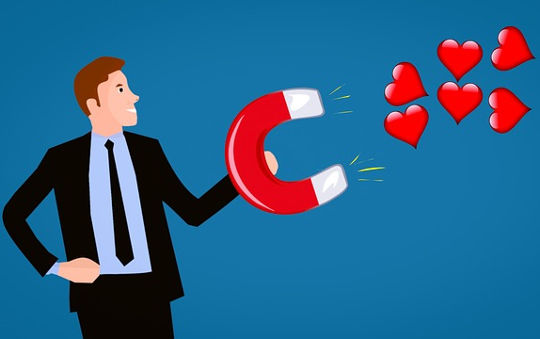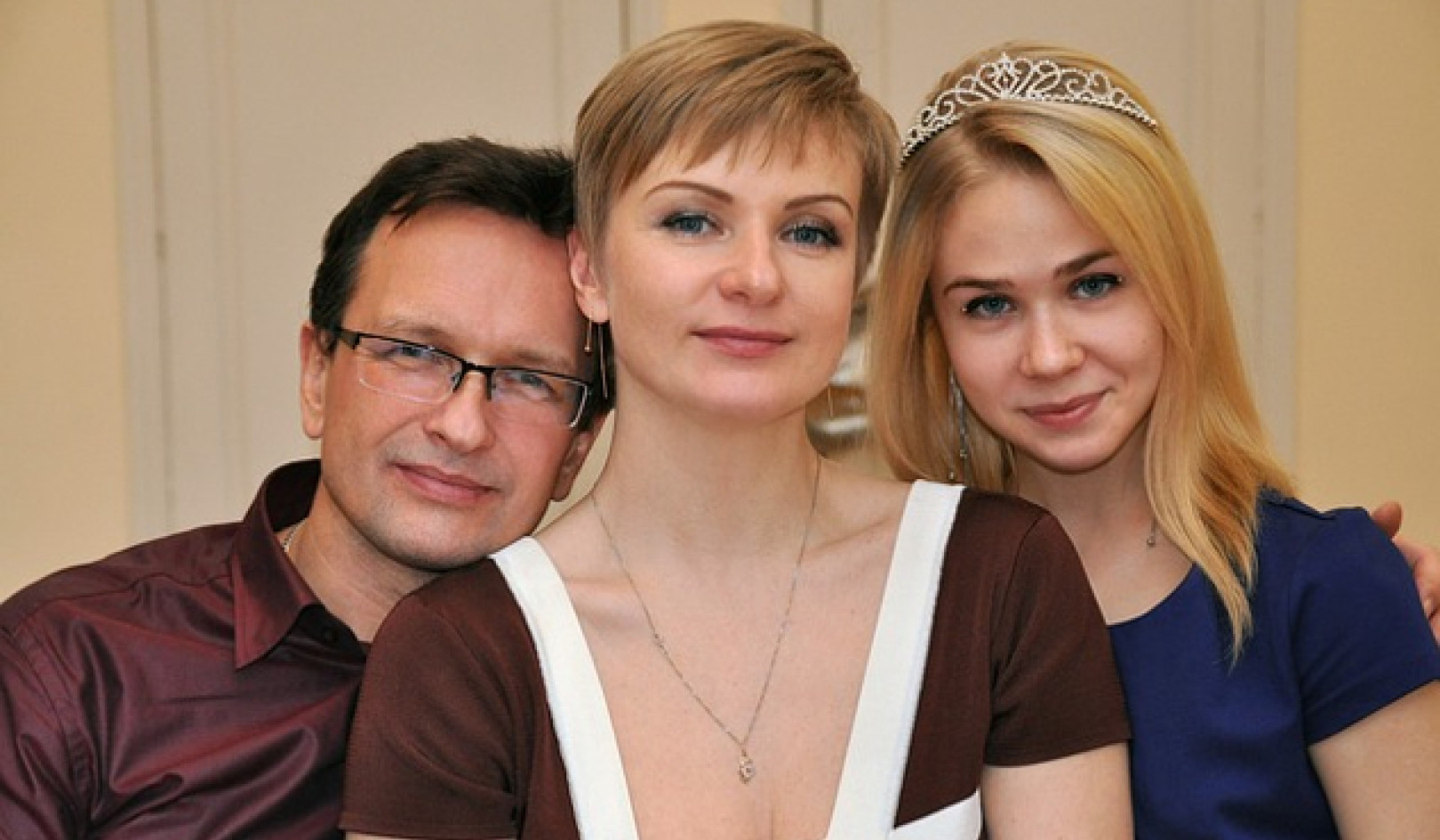
"To some extent, each of us marries to make up for his own deficiencies. In order to survive as children, we have all had to exaggerate those aspects of ourselves that pleased those on whom we depended and to disown those attitudes and behaviors that were unacceptable to them. What we lack, we seek and then struggle against in those whom we select as mates." -- Sheldon Kopp
Across a crowded room you will be attracted to a stranger because he seems familiar. The attraction is based on unconscious images of your parents, siblings, or even an aunt or uncle. It can be a mustache, a smile, the color of his eyes, a certain height or weight that triggers your attraction. (My husband, Jeff, wears a cologne similar to my father's and has a "candy drawer" just like Dad, even though he's a periodontist. I share a striking resemblance to his mother when she was my age.)
This image is what Dr. Hendrix calls the "Imago". It's an unconscious composite of your parents' positive and negative traits. When you meet your Imago, you unconsciously sense an opportunity to "fix" some of the "wrongs" of your childhood. It's the positive traits that make your knees weak, but the negative traits are actually more magnetic on an unconscious level.
The chemistry that turns you on is reminiscent of someone in your childhood whose love and affection you are still trying to recreate. Your unconscious mind says, "Here's a man who can make all my troubles go away. He can make up for all the things that went 'wrong' in my childhood and previous relationships and recapture what went right!"
When the Negative Triggers Hit the Fan
Everything goes smoothly until about the third date or shortly thereafter, which is when you begin to notice his negative traits. Your Imago's negative traits are powerful triggers that bring back unpleasant memories from your childhood and set off a cascade of painful emotions. What initially attracted you begins to repel you. The image of the partner who is most attractive to you is buried deep within your unconscious mind.
You began sketching this picture soon after your birth and before you were a teenager the composite was nearly complete. Your Imago has a dominant influence over the type of partner you seek, the way you relate to him, and how happy you will be together. The relationship script you wrote as a child is based on both the Imago you created and the childhood wounds you suffered.
Many people break up because they think their partner should only display positive character traits, and they don't want to accept the negative traits. When I say we pick the one who gives us the most I mean that the love of our life is also our crucible -- meaning a test or trial that will challenge us. (The term crucible was coined by David Schnarch.) Your crucible will be the one who will push your most tender emotional buttons and force you to stretch your comfort zone and grow.
Guess what? That's the way it's supposed to work. Choosing the partner who gives you the most trouble is Mother Nature's way of giving you a second chance to go back and heal your early wounds from childhood. Your partner is your crucible because he brings you face to face with your old, and often buried, heartaches. The partners who sometimes make us want to pull our hair out (or theirs) are actually the ones who teach us the most. This may sound hard to believe, but it's one of the few things that is certain and predictable about relationships.
Carbon Copy Mate: Been There, Done That?
If your relationship history is filled with carbon copies of the same man in different packages, it's because these men are precisely what you need most for your own development. They may not be the "ones" you want to live happily ever after with, but they are sure to be important stepping stones. Plus they give you a chance to practice the skills you're learning, so you are more confident when the "love of your life" enters the picture.
According to Dr. Harville Hendrix, bestselling author of Getting the Love You Want, relationships are created and should be nurtured and maintained so we can "finish our childhood with our partner, instead of running from our partner."
Certain needs must be met in each developmental stage of infancy and childhood. Needs that were not met -- or that you perceived were not met -- come out in frustrations with your partner. Since your perception of the world as an infant and child was so narrow, the occasions when your parents didn't understand or meet your needs became exaggerated and imprinted in your mind. From these experiences you formulated an unconscious picture of a "perfect parent or attachment figure."
As an adult, you project this unrealistic image of your "perfect parent" on to your partner or potential partner. Your hidden hope is that this person will meet your earlier unmet needs and somehow magically "complete you".
Trouble in Heaven: When the Fantasy Dissolves
 The trouble begins when you get angry with your partner or date for having the negative traits you associate with your parents and are trying to avoid. Ironically, since the negative traits create a stronger attraction, if your partner didn't have them, you wouldn't have been drawn to him in the first place.
The trouble begins when you get angry with your partner or date for having the negative traits you associate with your parents and are trying to avoid. Ironically, since the negative traits create a stronger attraction, if your partner didn't have them, you wouldn't have been drawn to him in the first place.
Fritz Perls, founder of Gestalt Therapy, suggests we all have "unfinished business" with our parents because all of our needs were not met all of the time. He suggests this unfinished business becomes "frozen" at some point in our childhood, and begins to "thaw" in adulthood when we enter a relationship with someone who fits our Imago.
For example, my patient Judy was attracted to one elusive man after another because her mother was overbearing and she was afraid of being smothered in a relationship. I was attracted to my first husband because he reminded me of my friend Barbara's father whom I considered "trustworthy, reliable, and nurturing". I was trying to avoid a man like my father because he was unfaithful to my mother when I was a child.
I hadn't done family of origin work with my father yet and my first husband was an "over-correction". He ended up being just as distant as my father because I unconsciously picked someone who was not very interested in having a sexual relationship. If you objectively look at your date or partner's traits you can easily see them in your parents.
The majority of relationships (married and single) stop before they start. People stop relationships for many reasons, but one of the biggest ones is that we're disappointed in our mates when they begin to display some of the very same traits we dislike in our own parents, or in ourselves.
When our real life relationship doesn't live up to our fantasy ideas of what a relationship is "supposed" to be, we mistakenly believe the "love is gone". Married and single couples emotionally "check out" of the relationship (often resorting to affairs) and singles walk away before the plot thickens.
Roadblock: It's Too Good To Be True!
Another roadblock that we place in a relationship is the belief that it won't or can't work, or that it's too good to be true. Married couples give up on their partners and singles give up before they have a chance to really get going. We do this because of our early scripts that say we will eventually be abandoned or suffocated. It's this fear that permeates our hearts and propels us to predict the outcome, or the end, of a relationship before we live out the beginning and the middle. Singles are particularly notorious for this sort of self-fulfilling prophecy, but married couples do it, too, especially when they're having problems.
We're so afraid of breaking up that we stop relationships before they start. Break-ups rule our lives. We fear we will break up, we actually break up, or we fear the other person will break up with us. My book Make Up, Don't Break Up will teach you how to triumph over the fear of breaking up and stop sabotaging your own efforts.
A relationship can stop before it starts at any point -- from the first date (or even before) up until you reach the Real and Lasting Love Stage. If you want your relationship to last, you must make it number one and nurture it. The most amazing stage of a relationship begins when you reach real and lasting love, but you can't get there if you keep stopping relationships before they start.
If you want to "talk about the relationship" it means you think there's a problem, or you're trying to jump ahead and predict the outcome, rather than living and experiencing it. Frankly, many relationships that could be strong and exciting get talked to death. I say talk less and enjoy each other more. It's action, not talking about action, that makes a relationship move forward. There is an effective way to resolve conflicts, fact-find, and learn what you need or want to know, but it requires special dialogue skills not just dumping all your feelings on your date or partner to "get things off your chest".
It's ironic that we can accept our friends' flaws and yet are often unwilling to accept the weaknesses of our partner. If we chose friends with the same rigid requirements we expect dates and partners to live up to, we would have very few friendships, if any. Look at your date or spouse through the same eyes you look at your close friends -- with understanding, compassion, gratitude for what they bring to the friendship, and acceptance of the traits you may not be so crazy about.
Self-Fulfilling Prophecies: Don't Predict the Outcome
How many times have you said, "I knew he wouldn't keep his promise," or "I knew she wasn't right for me." Too many times our fears turn into self-fulfilling prophecies. If you think it's not going to work, how hard are you going to be willing to try?
Relationships stop before they start because we predict a negative outcome and then help to make it come true with thoughts and words like, "Why bother? It's not going to happen anyway."
No matter how good a relationship is, when a couple hits difficult times, one or both of them is often tempted to give up -- allowing negative thoughts and fears to wash away their hopes for the future. One of them has to show confidence.
People often think they have only two choices:
1. To stay in a bad relationship.
2. To be alone.
We have many more choices than two! We can choose to learn about each other, really get to know each other's hearts and fears, and have fun in a relationship. Partners can learn how to play together and how to connect, disconnect, and reconnect without hurting each other.
You've got to go beyond your comfort zone. Life is about risks and putting yourself into greater levels of closeness and intimacy so you can learn to enjoy the journey.
Published by Adams Media Corporation,
www.adamsmedia.com
Article Source
Make Up, Don't Break Up - Finding and Keeping Love for Singles and Couples
by Dr. Bonnie Eaker Weil.
 In Make Up, Don't Break Up, love expert Dr. Bonnie offers her cutting-edge yet heartfelt advice on how relationships work, and how yours can work better. She walks you through the many stages of a relationship's connections and disconnections so that you will be able to reconnect and solidify your relationship.
In Make Up, Don't Break Up, love expert Dr. Bonnie offers her cutting-edge yet heartfelt advice on how relationships work, and how yours can work better. She walks you through the many stages of a relationship's connections and disconnections so that you will be able to reconnect and solidify your relationship.
Info/Order this book (second edition) and/or download the Kindle edition.
About The Author
 Bonnie Eaker Weil, Ph.D. is one of America's best-known relationship experts. She has appeared on the Today show, Oprah!, A Current Affair, The View, Sally, Ricki Lake, Montel, Maury Povich, and Extra. New York magazine has named Dr. Weil one of the city's top therapists, and her work has been featured in Good Housekeeping, The New York Times, USA Today, Cosmopolitan, Ladies Home Journal, and New Woman. She is also the author of Adultery: The Forgivable Sin. The author can be reached at 212-606-3787 for information regarding sessions, lectures, and seminars; or through her websites www.doctorbonnie.com www.makeupdontbreakup.com www.smarthearttherapy.com.
Bonnie Eaker Weil, Ph.D. is one of America's best-known relationship experts. She has appeared on the Today show, Oprah!, A Current Affair, The View, Sally, Ricki Lake, Montel, Maury Povich, and Extra. New York magazine has named Dr. Weil one of the city's top therapists, and her work has been featured in Good Housekeeping, The New York Times, USA Today, Cosmopolitan, Ladies Home Journal, and New Woman. She is also the author of Adultery: The Forgivable Sin. The author can be reached at 212-606-3787 for information regarding sessions, lectures, and seminars; or through her websites www.doctorbonnie.com www.makeupdontbreakup.com www.smarthearttherapy.com.
More Books by this Author
at InnerSelf Market and Amazon























